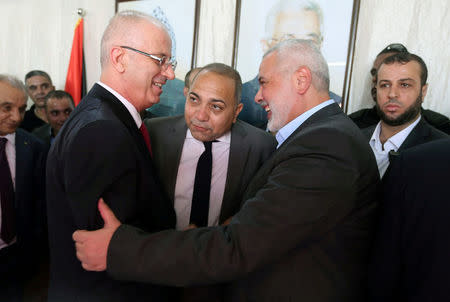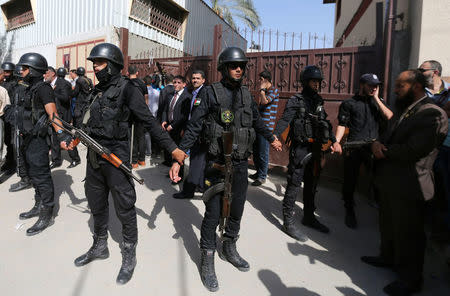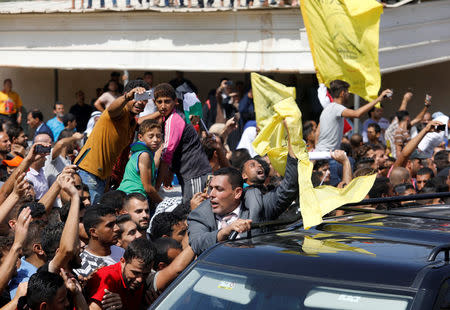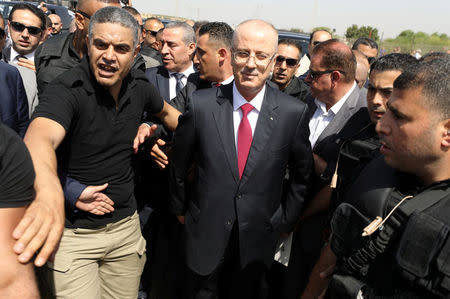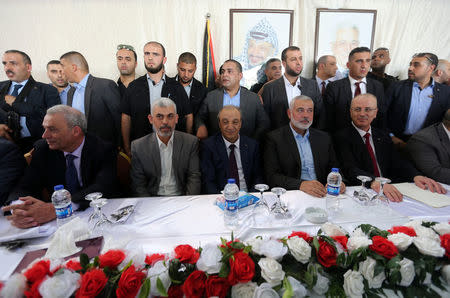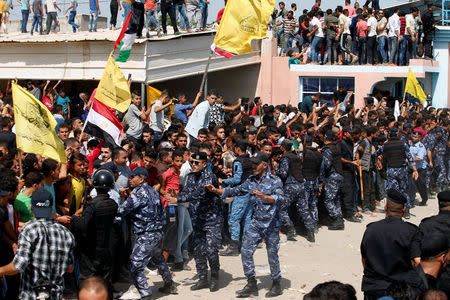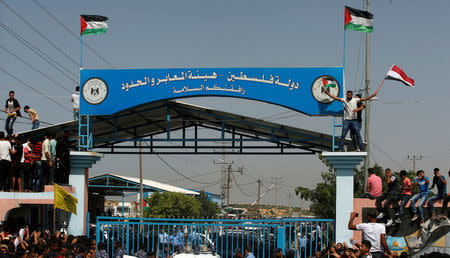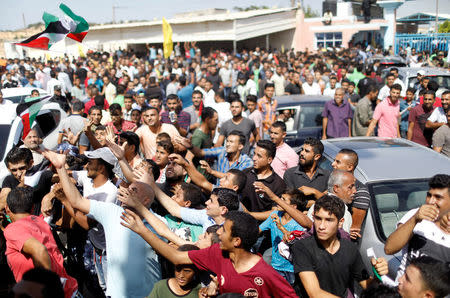Palestinian prime minister visits Gaza in move to reconcile with Hamas
By Nidal al-Mughrabi GAZA (Reuters) - The West Bank-based Palestinian prime minister crossed into the Gaza Strip on Monday in a move towards reconciliation between the mainstream Fatah party and Hamas, a decade after the Islamist group seized the territory in a civil war. Rami al-Hamdallah said at a welcome ceremony his unity government would begin assuming control of Gaza's administrative affairs, as well as "security responsibilities and responsibility for crossings and borders". Hamas, considered a terrorist group by Israel and the West, made its dramatic step towards unity last month, disbanding its Gaza shadow government, after Egypt, Saudi Arabia and the United Arab Emirates imposed an economic boycott on its main donor, Qatar, over alleged support of terrorism. Qatar denies the allegation. Under previous understandings, some 3,000 Fatah security men would be integrated gradually into a Gaza police force overseen by an Interior Ministry headed by Hamdallah. That deployment would still leave Hamas's armed wing -- analysts say it has at least 25,000 well-equipped fighters -- the dominant power in the Palestinian enclave of 2 million people. "We return to Gaza in order to conclude reconciliation and national unity and end the painful impacts of divisions and to rebuild Gaza brick by brick," said Hamdallah, who is an independent. Forces loyal to Palestinian President Mahmoud Abbas lost control of Gaza in fighting with Hamas in 2007. Hamas's reversal is the most significant step towards Palestinian reconciliation since the unity government was formed in 2014. It failed to function in Gaza - where Israel and Hamas have fought three wars since 2008 - because of disputes between Hamas and Fatah over its responsibilities. In his first comments after Hamdallah and his entourage entered Gaza, Abbas told Egyptian TV station CBC in an interview that his sanctions on the enclave would be lifted after the unity government takes control. "Everything must be in the hands of the Palestinian Authority, it must be the one to control the crossing points (in and out of Gaza),” he said, adding that there could be only one regime setting laws and enforcing them. Analysts said narrowing internal divisions could help Western-backed Abbas counter Israel's argument that it has no negotiating partner for peace with the Palestinians. A Hamas police honor guard and hundreds of Palestinians, many of them waving Palestinian flags, awaited Hamdallah outside the Hamas-controlled checkpoint, down the road from Israel's Erez border crossing through which the prime minister and his motorcade passed. "It is a day of Eid, a national holiday," said Abdel-Majid Ali, 46. "We hope this time reconciliation is for real." Nickolay Mladenov, the U.N. special coordinator for the Middle East peace process, wrote on Twitter: "The road ahead will be long and hard, but momentum of reconciliation and peace should not be missed." CABINET MEETING The unity drive also marked a return to prominence of exiled former Gaza security chief Mohammed Dahlan, once one of Hamas's fiercest enemies and now a leading figure in regional efforts to pull the territory back into the Palestinian mainstream. Dahlan, based since 2011 in the United Arab Emirates, is behind an influx of cash to prop up Gaza and detente between Hamas and Arab states including Egypt, which hosted reconciliation talks. Michael Oren, deputy minister for diplomacy in Israeli Prime Minister Benjamin Netanyahu's cabinet, said a key issue for Israel was whether Hamas, which is dedicated to Israel's destruction, would retain its weapons. "If it does, then it's a non-starter for Israel," he said. The U.S. was watching developments closely with the aim of improving humanitarian conditions in Gaza, Jason Greenblatt, U.S. President Donald Trump's Middle East envoy, said on Twitter, but insisted the new administration must abandon violence. "The United States stresses that any Palestinian government must unambiguously and explicitly commit to nonviolence, recognition of the State of Israel, acceptance of previous agreements and obligations between the parties, and peaceful negotiations," Greenblatt wrote. Both Israel and Egypt maintain a partial blockade of Gaza, citing security concerns. In public remarks at a lunch with Hamdallah, Hamas leader Ismail Haniyeh appeared to be uncompromising about any accommodation with Israel, calling for the establishment of a Palestinian state "on the full Palestinian soil with Jerusalem as its capital and the return of refugees to their lands and homes". On Tuesday, the Palestinian unity cabinet will meet in Gaza. "The agenda is crowded with ideas and projects," Culture Minister Ehad Bseisso said. In addition to setting a date for holding presidential and parliamentary elections, rival factions will have to resolve the issue of the fate of the 40,000 to 50,000 civil and military staff Hamas had hired since 2007. (Additional reporting by Dan Williams and Ori Lewis in Jerusalem, Matt Spetalnick in Washington and Ali Abelatti in Cairo; Editing by Alison Williams and Cynthia Osterman)

